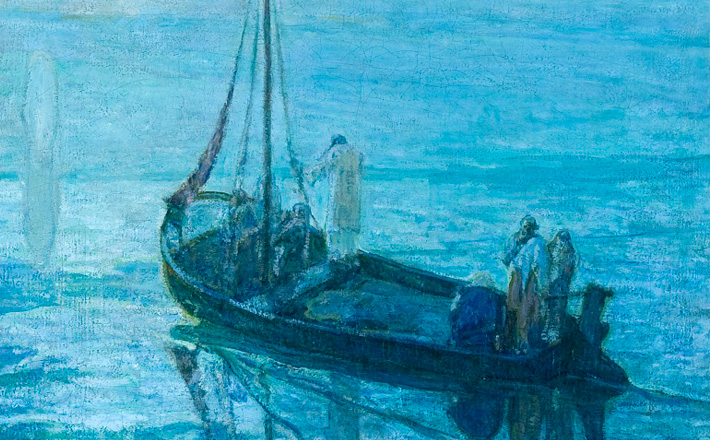Commentary on Genesis 37:1-4, 12-28
This week’s passage highlights a timeless theme of family dysfunction.
The background: Genesis 37:1-4
Genesis 37:2 gives a clean introduction, “These are the generations of Jacob.” We receive details of the story that will prime us for some major family drama:
- Jacob’s father was an immigrant (verse 1)
- Joseph is 17 years old (verse 2)
- Joseph shepherds with his brothers (verse 2)
- Joseph is a bit of a snitch (verse 2)
- Joseph is his father’s favorite child (verse 3)
The detail of favoritism is particularly significant as it develops more fully in the rest of the narrative. Joseph was the youngest, but he was the unequivocally favored child. In patrilineal societies, the eldest son was the favored one, as he was the one to receive the largest share of the estate and take over as the next patriarch. The unexpected favoritism towards Joseph was naturally upsetting to the older brothers. It should be noted that in this patrilineal social setting, daughters were not in the conversations. Sometimes details in the Bible are reflective of culture over moral norms so let us all proceed judiciously.
The transaction: Genesis 37:12-28
The implied tensions in Genesis 37:1-4 are later manifest in the sale of Joseph to the passing caravan. The brothers are “near Shechem” without Joseph. These brothers have two commonalities: a shared task of pasturing the flock and a shared hatred for their youngest brother. A narrative tension arises with Jacob’s command to “bring word back to me” (verse 14). This mimics the earlier episode in verse 2, when Joseph goes to the brothers and brings back a report of evil to the father. The narrative is set so one will expect the same result. Joseph goes, Joseph gives a bad report, and the father rewards the youngest at the expense of the other brothers.
But before this can play out, the brothers intervene as “they conspired to kill him” (verse 18). Linguistically, this is a hitpael construction, a relatively rare Hebrew verbal stem that is both reflexive and causative. So perhaps another way to capture this verb in translation is “they caused deceit to themselves to kill him.” The pre-modern agrarian setting meant that kinship, specifically brotherhood, was a crucial component of their life. Their lives would be woven together from cradle to grave. They knew that they owed complete fidelity to their father’s wishes.
But the family dysfunction resulted in the brothers causing deceit to themselves. Naturally, the brothers had real envy at Joseph’s special abilities. The father’s favoritism exacerbated matters. These details invite us to contemplate the complexities within the minds of the brothers. There was real fear of Joseph delivering another unfavorable report to the father. The brothers did not make a rash decision, for they had a lot to lose. The ensuing dialogue among brothers further illustrates the conflicting feelings.
They mock him and make a plan for physical punishment. Then Reuben, perhaps with a tinge of remorse, convinces the brothers to spare him death in place of emotional shame (“they stripped him of his robe,” verse 23) and physical punishment (“there was no water,” verse 24). Judah then adds the potential of material gain to sell him to the traveling caravan of Ishmaelites. Perhaps the transaction assuaged some ongoing guilt at the offense, but ultimately the brothers violated a core value of ancient Near Eastern family life and a biblical law (Exodus 21:16; Deuteronomy 24:7). In this case, the brothers valued “profit” (verse 26) over the “brotherhood.” The selling of their brother for twenty shekels of silver underscores the moral depravity.
I write these words in the first week of June 2020, as the nation is fractured under the murders of George Floyd, Breonna Taylor, Ahmaud Arbery, and others. I cannot predict the pulse of the nation as you preach this passage. But I have two gentle warnings. First, do not be tempted to use this passage to preach on God’s sovereignty. It is not explicit in the passage (yet). Second, do not fall into the temptation of an overtly Christological interpretation. I understand the commonalities later embedded in the Gospel accounts of Jesus’ death and resurrection, but again, this is not in the text.
Instead, I urge you to preach this passage with attention to the brothers. How did these ten brothers end up stripping their youngest brother and selling him into a life of slavery? The answer is complex. Each of the ten had a different reaction to Joseph. Surely, upon seeing their brother coming to them, they experienced conflicting emotions of both fraternal loyalty and sheer hate. They also had fear for their own futures. Their father’s unfettered devotion to Joseph surely caused pain, masked by jealousy. Two of the brothers may have diverted an immediate death sentence for a more drawn out one. But in the end, ten brothers boosted themselves to protect their privilege, and sacrificed the life of their brother in the process. But even Reuben and Judah are not excused from this act of evil.
The hermeneutical payoff goes back to the hitpael verb of Genesis 37:18. Reading the text is an invitation to sit in the perspective of the ten brothers. How do we “cause deceit to ourselves” in ways that protect our own privilege at the expense of those in marginalized spaces? This is the reading that is so important with the reality of the violent dangers that African American communities face in daily life. Perhaps this passage can compel Christians to examine their present and historic complicities in the racialized terror that plagues Black bodies. Yes, we know that God is sovereign. But this passage ends with Joseph sold and being sent to a lifetime of servanthood. We cannot let the sovereignty of God rescue us from our moral responsibility. The sovereignty of God does not invalidate the present pain of oppression. The passage ends with Joseph in suffering with no justice in sight. Many in our faith communities will relate.


August 9, 2020